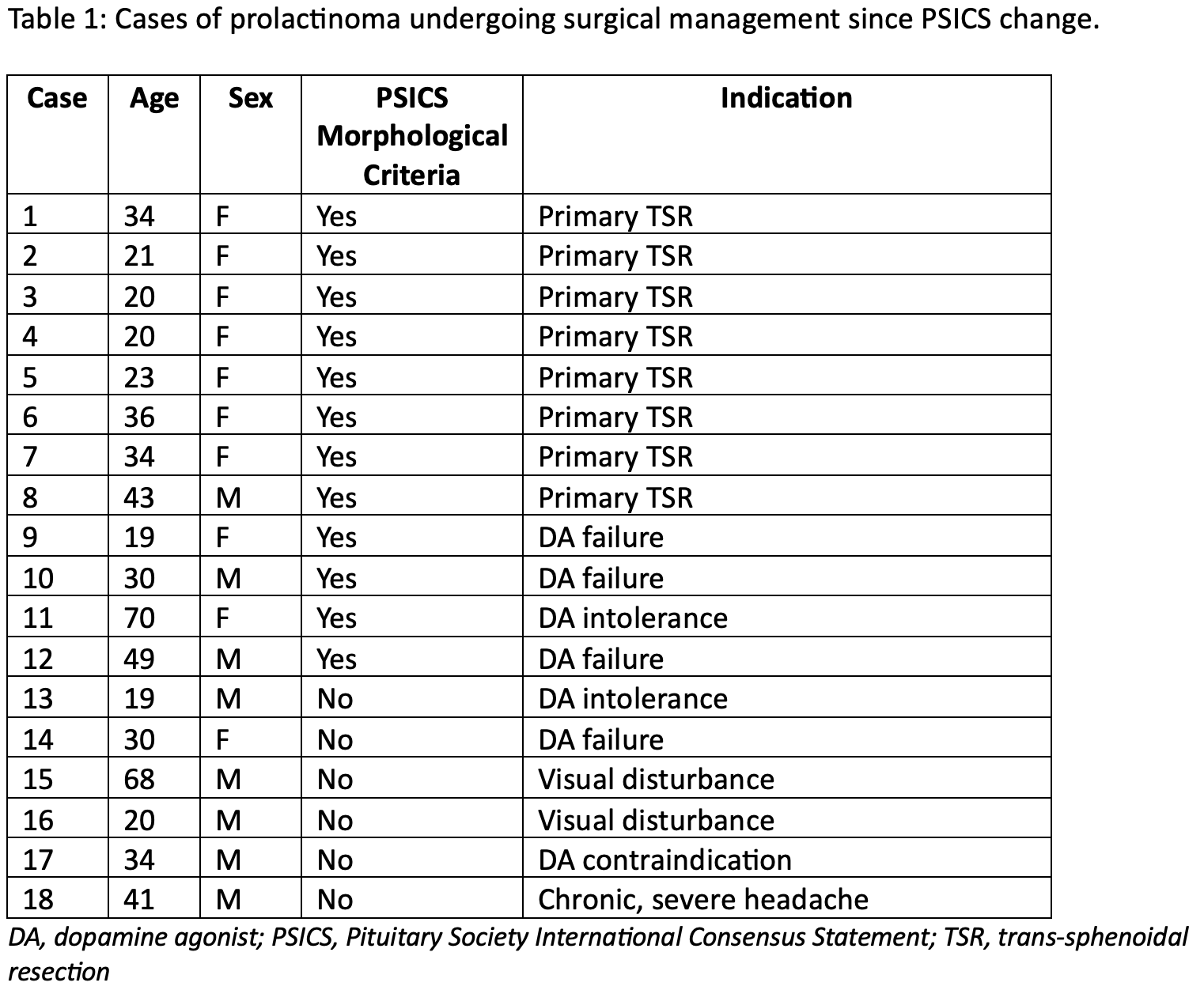Oral Presentation Australian and New Zealand Pituitary Alliance 2025
Surgical management of prolactinoma since the updated 2023 Pituitary Society International Consensus Statement: an early Australian experience. (123529)
The management paradigm for prolactinoma has recently evolved with the 2023 Pituitary Society International Consensus Statement (PSICS) recommending consideration of both trans-sphenoidal resection (TSR) and dopamine agonist (DA) therapy as first-line treatment options for discrete, intrasellar tumours [1]. This reflects improving surgical outcomes, the increasingly recognised side-effects of long-term DA therapy and the relatively low rates of disease control after DA withdrawal [2, 3]. We present a review of our institutional experience with a focus on patients undergoing surgery since the PSICS update.
Clinical, radiological and biochemical data were retrospectively collected from consecutive adult patients undergoing TSR for prolactinoma at our tertiary neurosurgery centre from September 2023 to April 2025. The subgroup that met PSICS size criteria (discrete tumour, Knosp 0-1) and underwent primary TSR were analysed in comparison to the remainder of the cohort.
Eighteen patients underwent TSR during the study period (Table 1). The frequency of this procedure at our institution increased from 2.5 cases per year (January 2010 – August 2023) to 10.8 after the PSICS change. Eight patients underwent primary TSR after multidisciplinary counselling. The remaining 10 patients underwent TSR due to DA failure (n=4), visual disturbance (n=2), DA intolerance (n=2), DA contraindication (n=1) and chronic headache (n=1). Those patients undergoing primary TSR were more likely to be female (n=7/8 [87.5%] vs n=3/10 [30%], p=0.03) and had significantly lower immediate post-operative prolactin levels (n=7, 144 [26-318] vs n=10, 730 [226-2037] mIU/L, p=0.01) compared to those undergoing secondary TSR. In the primary TSR group, immediate post-operative normoprolactinaemia was observed in 85.7% (n=6/7) and gross total resection on MRI in 100% (n=4/4). A single case of transient AVP-deficiency was observed in each group.
Primary TSR is a safe and effective first-line treatment for discrete, intrasellar prolactinomas. Ongoing prospective study comparing medical and surgical management is warrranted.

- 1. Petersenn, S., et al., Diagnosis and management of prolactin-secreting pituitary adenomas: a Pituitary Society international Consensus Statement. Nat Rev Endocrinol, 2023. 19(12): p. 722-740.
- 2. Zamanipoor Najafabadi, A.H., et al., Surgery as a Viable Alternative First-Line Treatment for Prolactinoma Patients. A Systematic Review and Meta-Analysis. J Clin Endocrinol Metab, 2020. 105(3): p. e32-41.
- 3. Ottenhausen, M., et al., Surgery as first-line treatment for prolactinoma? Discussion of the literature and results of a consecutive series of surgically treated patients. Neurosurg Rev, 2023. 46(1): p. 128.